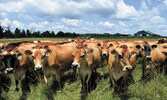Bill van Nes' St. Brigid's Creamery wins Organic Council award as a trailblazer
BY SCOTT STEPHENSON
Dairy farmer Bill van Nes was caught off guard when he learned he had been named the Organic Council of Ontario’s (OCO) 2025 Organic Trailblazer Organic Champion, but his new title couldn’t be more fitting. Van Nes is being recognized for his leadership in high-quality organic dairy production and his steadfast commitment to ethical, environmentally-conscious farming.
On his farm just outside Brussels, van Nes manages his Jersey cows with compassion and respect, while ensuring they have everything they need to succeed. The results speak for themselves - his happy herd is behind one of the country’s most sought-after culinary treasures: St. Brigid’s butter.
Born and raised on a family farm in Huron County, van Nes has always been a member of the agricultural community. He took his first steps away from conventional farming for a simple reason. “I really like the sight of cows on drives, and I saw the conventional way with cows more inside and less outside, so I wanted to go the opposite,” he explained.
Today, van Nes’ business is firmly rooted in the organic principles he believes will bring about the best butter possible. “I’m not going to lie - organic is a lot of work, especially the way we do it, focusing on cattle and pasture,” he admitted. “But there’s a reward for that. It’s very aesthetic, very pleasing to see cattle in their natural landscape instead of being in a barn all the time. I get the most satisfaction from that from the aesthetics, the senses, and producing a product that simply cannot be matched by conventional practices.”
For van Nes, being called a trailblazer means setting an example for others in the industry. “Just bringing organics to the next level and introducing a premium product - basically elevating the presence of organic through quality food,” he told The Citizen.
As a longtime member of the OCO, van Nes feels honoured to be singled out. “It’s definitely something to be proud of,” he pointed out. “It helps to have our work recognized in the public sphere and by your peers. It’s gratifying and motivates you to keep going, to persevere.”
He also praised the OCO for its leadership and advocacy. “They play a great role, and it can be larger. They’re coming up with an organic action plan across Canada to give more recognition for the good that organic can do,” van Nes said. “It’s very important to showcase what can be done with organic, for others to follow suit, and to bring it to the forefront, so it garners the recognition it deserves.”
Consumer attitudes toward organic food, he noted, have evolved dramatically since he first entered the business. “When I started farming 30 or 40 years ago, organic was in its infancy - especially organic milk,” he recalled. “It’s come a long way. Appreciation for organic has increased for sure…. Our butter gives organic a very good name. It’s simply not possible to make that product with conventional methods.”
Among the farm practices van Nes is most proud of are his rotational grazing methods and his commitment to animal welfare. “Being able to feed the cows as much fresh grass and pasture as we do - having them in their natural habitat, letting them experience the weather - our cows don’t need to be shielded from every element all the time,” he informed The Citizen. “Growing up, we had three fields - one for dry cows, one for high-milking cows, and one for low producers. And that was it for the year. When it was gone, it was gone. Now, we move the cows around and give them much better access to fresh pasture.”
That same philosophy extends to the soil beneath his herd. “We take it seriously - through rotation, multicropping and diversity, among other things. It’s very important because we believe we’re building soil and sequestering carbon,” he declared. “Organic farming has a definite role to play in building soil and storing the carbon everyone’s talking about.”
Van Nes is optimistic about the future - he believes that organic agriculture has an important role to play in Huron County’s farming landscape. “There’s definitely room for growth, especially for smaller landholders. The mantra of ‘get big or go home’ is only getting worse with large land prices,” he explained. “Organics is a clear challenge to that mentality. We need to return to everyone growing food at home as much as they can - like during the war era, when everybody had a home garden. We need that attachment back to the Earth. Other countries make better use of smaller parcels of land that big agriculture can’t access. There’s more room for that here, and I think we need to embrace it. It’s a mindset we need to build within the community: to grow our own food. It’s satisfying. We are what we eat.”

